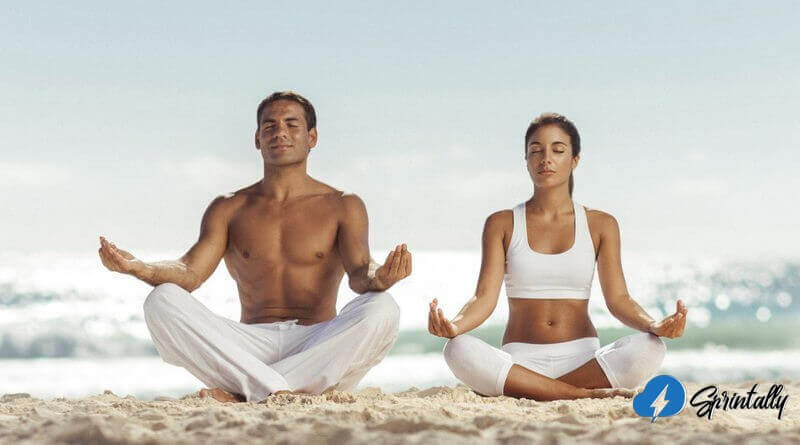Meditation: what is it, how to meditate for beginners

Meditation: What do Robert Downey Jr., Oprah Winfrey, Kobe Bryant, Sting, Angelina Jolie, Paul McCartney, LeBron James, Hugh Jackman, David Lynch, Julia Roberts, David Duchovny, Nicole Kidman, Orlando Bloom, Cameron Diaz, Richard Gere, Richard have in common as well as Boris Grebenshchikov, Alexander Vasiliev, Maria Sharapova, Vera Brezhneva, Sati Casanova and German Grief? They are very successful. And they are meditating.
What is meditation?

Meditation is a mental exercise that originally arose as part of spiritual and religious practice, which is usually performed by focusing on one object (most often internal, such as breathing), or by directing attention to what is happening here and now (open observation), not allowing a person to get stuck in their thoughts.
Meditation is an individual practice, although it is often performed in groups. A practitioner holds his body in a sitting position for a certain period of time by closing his eyes or leaving his eyes open. In addition to sitting meditation, meditation is distinguished when walking.
The goal of the meditation process is to keep attention on the selected object for as long as possible.
When you try to consciously control the focus of your attention, you will notice that your mind is completely unaccustomed to such tricks.
Over the long years of lack of meditation in your life, the habit of wandering, going to different parts of your memory or being in thoughts of the future, has become more natural for your mind.
Instead of concentrating completely on the object of meditation, you will constantly be distracted by thoughts about everyday life.
A wandering mind is a norm for an inexperienced person in awareness. Therefore, once again, having noticed that you are distracted, gently return your attention to the object of meditation.
If in one sentence, from the technical point of view, meditation is a set of cycles of focusing attention on the object of meditation, which are replaced by distraction, then return, then again distraction, then return, etc.
Meditation is not an attempt to suppress or get rid of negative thoughts, an outlandish sitting in the lotus position or a way to become an adherent of Buddhism. This is not a relaxation exercise, prayer, self-hypnosis, or mantra recitation. Meditation is not the prerogative of monks, religious people, bearded Indian gurus, Tibetan lamas or saints.
Meditation is a simple mental exercise that everyone can do.
Purpose of meditation

Meditation has its roots in Indian religious teachings and practices, such as Hinduism, Buddhism, Jainism, Advaita Vedanta, yoga, which are based on the Vedas - one of the oldest scriptures.
In this context, the purpose of meditation is awakening (enlightenment), the cognition of the absolute, the realization of your true self, the achievement of Satori, Moksha, Nirvana or oneness with God.
Think for a moment: everything that you observe around you is a subjective reflection of objective reality with the help of your mind.
All that you see, hear and feel is an image, a picture that looms through your mind and is in your head.
But your mind is the artist who paints a believable canvas of not only the sky, nature and cities. It also pulls to take portraits, a favorite character which is your own self, you identify with your body and personality, which is as much subjective as anything else.
Meditation is a practical means of calming the mind in order to release existing subjective prejudices based on conceptual thinking and to see reality as it really is, openly and clearly.
This doesn't mean that the green grass as a result of enlightenment will turn blue for you since the sensory receptors of your body will remain the same. However, the subjective image of yourself, your “I”, will change radically, while changing your attitude towards the surrounding reality.
You will understand who you are, or rather, who you are not. It will be strange and unusual for you to realize that you are neither your body nor your mind. You are something, but you are not the body. You are pure consciousness.
Thus, meditation allows you to go beyond the mind and know your true nature - the nature of the Buddha, which can be described as peace, happiness and bliss.
However, most ordinary people do not set themselves the goal of awakening. Why then do you need meditation?
The fact is that a side effect of meditation is the extensive health benefits, due to which it can literally change a person from the inside for the better.
From early childhood, each of us was encouraged to study the outside world, but no one said what was inside of us.
Therefore, we, trying to learn as best as possible of others, still remain strangers to ourselves. Lack of understanding of ourselves is one of the main reasons why our relationships with other people fail, and therefore confusion and frustration often prevail in our lives.
Meditation allows you to better understand yourself, increase awareness, gain control over the eternally fussy mind, and therefore over your destiny.
Meditation helps to overcome stress, improve concentration, and overall make life happier.
Some people meditate simply because this practice makes them feel better.
Others are trying to find calm and poise, better cope with the crisis stages in life, get rid of insomnia, as well as bad habits and other addictions.
The benefits of meditation

- Improving health, getting rid of bad habits, increasing immunity, lowering blood pressure, reducing pain.
- Increasing happiness, increasing positive emotions, overcoming depression, reducing anxiety and stress levels.
- Improving relationships with other people, expanding social ties, and developing compassion.
- Improving self-control by controlling the reaction to emerging emotions and events.
- Brain development in the literal sense due to an increase in the amount of gray matter in some areas.
- The development of awareness, increased efficiency, improved memory and attention, the ability to multitask, as well as innovative and creative thinking.
How to meditate at home

1. Turn off the sound on your phone
Perhaps this is the most important rule that you should adhere to before you begin to meditate.
There is no worse way to interrupt meditation than by leaving your phone with the ringtone on, accepting an incoming call or text message.
2. Time for meditation and its duration
Each meditator should determine their own optimal time for meditation, which can vary from early morning to late evening.
Consider your daily routine, as well as evaluate and compare the feelings that you experience during morning or evening meditation.
At the very beginning, the duration of meditation can be set from 2 to 5 minutes, gradually increasing it to 40 minutes or even up to 1 hour.
Alternatively, you can meditate twice a day for 20 minutes.
How to understand that you should increase the duration of meditation? Listen to your body, it itself will express a desire to raise the bar to a new level.
Try to meditate at the same time every day, because this way it will be easier for you to develop this good habit.
Don't start meditation on a full stomach, because in such conditions you will often be distracted and sleepy.
On the other hand, it’s better not to meditate when you are very hungry, otherwise, the only thing that will swallow you whole is not concentration, but thoughts about food.
3. Place
The place you choose for your meditation is as important as choosing the right time.
A calm place where you will be comfortable is best. Ambient silence will help ensure silence within you.
4. Tools
It is best if you meditate while sitting on a pillow in the lotus position. A pillow is necessary so that the hill formed due to it does not allow painful sensations in the legs to occur.
However, don't be ashamed to meditate on a chair, while your legs must always touch the floor. Still, a combination of pillow and lotus position is the preferred choice.
In order not to be distracted from the process of meditation and not look at the clock or in the right corner of the computer monitor, set an alarm for the time in which you plan to complete your practice.
5. The process of meditation
Why exactly a sitting pose
Meditation involves conscious relaxation. Therefore, if you lie down, it is likely that you will fall asleep. If you continue to stand or walk, the mind will remain active.
How to sit
Sit in a comfortable position, but try to keep your back straight.
If you are uncomfortable with a straight back, slide the pillow against the wall or rest against the back of the chair.
And again: find the most comfortable pose for you.
Before you begin meditation, scan your entire body with your attention in order to relax all its parts, except for the muscles necessary to maintain a straight back.
Face and eyes
You can meditate with both eyes open and closed.
Perhaps at the very beginning, it will be more comfortable for you not to close your eyes, however, as you work out the meditative hours, you will most likely move on to meditation with your eyes closed.
Tilt your head slightly, and also allow a barely noticeable smile to appear on your face, thanks to which it will be easier for you to relax and feel peace.
Legs and arms
If you meditate on a pillow, then cross your legs in front of you. If you decide to meditate on a chair, do not forget that your feet should touch the floor.
Hands are recommended to lower at the base of the legs, putting one palm on the other.
Breath
Don't try to control your breathing. Let your body breathe without external effort.
Perhaps at first, the breath will seem deep and definitely obvious to perception. However, when your attention is concentrated on the object of meditation for a sufficiently long time, breathing will become light, quiet and barely noticeable.
To make breathing more free and natural, try not to wear clothes that can compress the abdomen.
Attention
In the process of meditation, carefully observe how your stomach rises and then falls.
In addition, you can concentrate on the breath itself, noticing how the air enters and leaves your lungs, or shift the focus of attention to your nostrils, aware of breathing at the tip of the nose.
When you train to focus on a selected object, try open observation meditation, in which your attention is not fixed on any object.
In this case, allow your thoughts and feelings to arise, be aware of them, but do not evaluate and analyze, but as if look from the side.
Just watch them, as if you saw a cloud in the sky, not trying to figure out why it is of such shape and color.
Choose the method of concentration that is most preferable for you at a particular moment in time.
In the process of meditation, your mind will divert your attention away from time to time, forcing you to indulge in thoughts about the past or future.
Noticing that you are distracted, return attention to the object of meditation, but never blame yourself for it.
And still, remember that the removal of guilt does not give you permission for an imposing attitude to the process. About how you met a beautiful girl the other day, or what an unpleasant dialogue took place the day before with your leader, you will think after completing the meditation.
Just understand that the most important thing for you now is your breathing.
Thoughts
As already mentioned, do not cling to emerging thoughts. Instead, just tell yourself, “I will return to them a little later.”
On the other hand, do not try to push away your thoughts. You cannot just order, “Come on, mind, stop thinking now!”
What you resist tends to continue to be present. Whatever you do, don't try to clear your mind, because it is pointless.
Instead of declaring war on your thoughts, just let them come and go, observing them without making assessments or judgments. As you gain experience in meditation, the frequency of their occurrence will decrease.
If you, having become very dirty, decide to wash away the dirt by bathing in the lake, how actively will you try to wipe off the dirty parts of your body? What are you going to do?
Nothing. Having plunged into the water, you simply begin to swim, and the body itself cleans itself with time.
Get in harmony with your thoughts and they will stop bothering you. You do not need to be afraid of them, because you know that they will come and then leave you.
You should not identify with thoughts or allow them to control you. You will see that you are not your thoughts. You are that background on which they arise.
6. Tips
- Start small. Don't immediately try to meditate for half an hour. From two to five minutes will suffice for beginners.
- Meditate daily. 10 minutes each day is better than 70 minutes once a week.
- Before you meditate, eliminate all possible distractions.
- As ring the alarm, select a calm and quiet tone.
- Keep in mind that the easiest way to lose focus during exhalation.
- Don't criticize yourself for the results. Once your mind over and over again, that you are doing everything wrong, just continue to meditate. Believe me, with the time you will feel the progress.
- Be kind to yourself. Despite the apparent simplicity, meditation can seem difficult and confusing, especially in the beginning. So please be patient and treat yourself with understanding.
- The main problems during meditation:
-
desire something else or something more;
-
extremely negative emotions: fear, anger;
-
anxiety, worry;
-
sloth and drowsiness;
-
doubt: “It is useless, nothing happens.”
- If you miss the practice of meditation, just start again. Meditation is, rather, not a sprint but a marathon.
-
Myths about meditation

1. Meditation eliminates thoughts
The purpose of meditation is not to get rid of but to distantly observe thoughts and feelings that arise.
You simply let them be, testify to their presence, and then return your attention to the object of meditation.
After gaining experience in meditation, uncontrolled thoughts and emotions will weaken by themselves.
2. Meditation is just a technique for relaxation and concentration
Relaxation and concentration are not the exclusive value of meditation.
Don't forget about its other advantages, such as increased immunity, performance, self-control, level of happiness, overcoming stressful situations, etc.
You will not get these benefits from simple relaxation exercises.
3. It takes years to achieve results
The obvious advantage of meditation is the long-term benefits. However, in order to feel the results, it may take only a couple of months of practice.
4. Meditation is a religious practice
Meditation really came to the land of worldly life from an ocean of religious teachings.
However, meditation in itself is not an exclusively religious attribute. This is just an exercise that can calm the mind, bring peace of mind and improve human health, as evidenced by scientific research.
You don't need to wear special clothes, chant mantras, attend a temple or other special place.
5. The process of meditation is a pleasant time
In photographs, meditators are often portrayed as if they had reached a state of genuine bliss.
And although with the time you will really enjoy meditation, for beginners it will most likely seem to be something related to internal stress, anxiety or boredom.
6. Meditation will turn you into an insensitive robot
Meditation will really make you less prone to emotions, saving you from their slavery. But this doesn't mean that you will become insensitive zombies.
You will still enjoy the good things in life, and even more intensely than before, because you will begin to become more aware of the true joys of life.
As for negative experiences, they will be much less likely to bother you.
You will create a natural gap between your “I” and your emotions. You will increasingly identify with something more than thoughts, emotions, problems, etc.
7. Meditation is a way to get away from problems
In reality, the opposite is true. Meditation, as a tool for developing awareness, will allow you to better understand the situation in life, and will also help you find a way to solve existing problems.
The majority of people who try to distract themselves from TV, video games, social networks, alcohol, empty communication and other distracting factors take flight every day.
A modern person can live one day with great difficulty, so as not to check the messages on his phone.
That is why excitement arises when you have to be alone and in silence.
8. I don't have time for meditation
Remember the first paragraph of this article and the people mentioned in it. It is unlikely that their life is less eventful than yours, and yet they meditate.
Conclusion

Meditation gives you freedom from the vicissitudes of the mind, thanks to which you can better understand who you really are.
As a result, you are far from the hustle and bustle of your life, you experience joy, satisfaction, relief and relaxation. It’s like you give yourself an inner vacation.
Through the practice of meditation, you learn to be open to everything that you have to face daily and gain the ability to devote all your attention to each event.
People without a developed awareness skill usually respond immediately to emerging thoughts and emotions.
If someone tells you something negative, you become angry or depressed. When you lose something, you are overwhelmed by frustrated feelings.
Your mood depends on life situations, and life itself resembles a roller coaster ride.
You react before you fully understand the cause of emerging emotions. You immediately interpret everything that you see or hear, in accordance with your expectations, fears, prejudices or the desire to gain control.
You limit yourself to one or two ways to solve the problems that have arisen, instead of openly and creatively approaching overcoming obstacles.
But if you begin to relate to experiences consciously, you can fully understand what is happening.
You have the opportunity to objectively evaluate the initial reaction, in turn reacting to it approximately as follows: “Oh, look. This makes me angry. ”
Be open to your thoughts and emotions, and they will pass through you without getting stuck inside.
Willingness to accept everything as it really is will allow you to find natural and spontaneous answers to questions that arise, choosing the most suitable one for each specific situation.
Meditation not only leads to emotional balance and stability but also reveals your inner complexes, feelings of dissatisfaction and unproductive habits.
Instead of following negative motives, negative experiences are brought to your awareness, where they, being under the bright beam of the spotlight of your attention, are purified and cease to be part of your life.
Some of the most important benefits of meditation become noticeable gradually, without being characterized by a revolutionary leap and quick results.
Continue the practice of meditation and one day you will find yourself capable of experiencing the joy of being fully present here and now.





